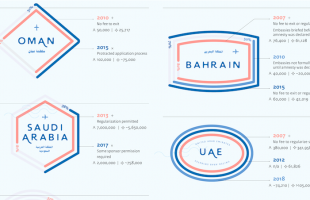Trapped Nepali worker leaves Qatar after 13 years; Systemic issues still cause for concern
With one small bag and little to show for his 13 years in Qatar, Roshan Kumar reached Katmandu on the morning of October 18.
Around 7 a.m. the day prior, he stepped out of the ‘detention centre’, what he calls the jail. “I was worried my name was not on the list last two days, but it was on the emergency list. They are taking me to the airport now.” The excitement is palpable.
A few days earlier, a Qatar-based civil society organisation managed to pay the money required to fund his ticket to Kathmandu.
But Roshan’s story started much before this. About 13 years earlier. You can read more about his story here on Migrant-Rights.org.
“Roshan Kumar of Nepal has been in Qatar for 19 years, but to say that he has lived in Qatar would be too wide a statement. The last time he had been home was in 1996 and since 2001, he has been in and out of jails and detention centres, and has headed to the airport half a dozen times only to be stopped at immigration.
For the last 17 months, he has been in Block 7 of the Deportation and Detention center… a place of hope as far as he is concerned, as it’s one step away from taking a flight to his home country, to see his wife and his three children after 17 long years. His youngest son was just a babe in arms when he left home.
His story is an extreme case of the kafala system’s insidious restrictiveness.”
Soon after his case came to light, Amnesty International worked closely with Qatar’s National Human Rights Committee (NHRC) to secure his release.
Amnesty International’s researcher on migrant rights, James Lynch says, "When we heard about Roshan's case we asked the National Human Rights Committee's assistance to investigate what could be preventing him from leaving and how it could be resolved. We are grateful for their intervention, which seems to have resulted in Roshan's travel ban finally being lifted."
His family had been anxious as a whole day had passed since his departure from Qatar but he hadn’t reached Kathmandu yet. However, several flight delays and long transits later, Roshan landed in Kathmandu, and took a solo taxi ride through Kathmandu to reach home.
“My country, so I can’t forget the route, but so much has changed. And when I reached home, I saw my family. Now all my sisters are home. Everyone is here,” he said on a phone call, straining to be heard over all the noise and revelry in the background. His children are now young adults – 18, 21 and 24.
"Roshan's case raises some very serious questions about why the Ministry of Interior was unable to secure his departure itself – he should have been able to go home long ago. It also highlights the apparent isolation people in the detention centre. Roshan should have had legal aid to help him sort out his court issue. Instead he was marooned in a centre which does not even allow detainees to have mobile phones,” says Lynch, underlining the systemic legal and administrative issues migrants endure.
Meanwhile, Roshan, on a call from Kathmandu, makes a plea:
“There are so many people in the detention centre. Some have committed crimes, but there are few who are there for no reason at all, and no one to help them. Someone should help them. All of you should help.”




